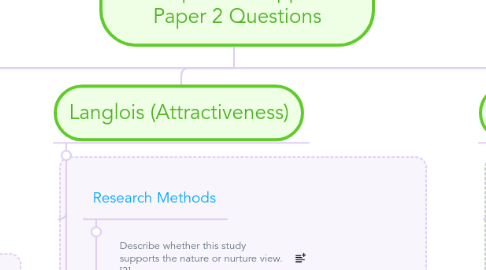
1. The Developmental Approach
1.1. Outline
1.1.1. Outline what is meant by the ‘developmental approach’ in psychology. [2]
1.2. Evaluation
1.2.1. What are the advantages of using the developmental approach for psychologists? [9]
1.2.2. What problems may psychologists have when they investigate developmental processes in children? [9]
2. Bandura (Aggression)
2.1. Behavioural Approach
2.2. Research Methods
2.2.1. Describe how data were collected from the children in this study. [3]
2.2.2. Describe the laboratory experiment as a research method and outline how it was used in the Bandura et al study. [5]
2.2.3. Describe the developmental processes that were investigated in this study. [3]
2.2.4. Describe how the snapshot method was used in this study. [3]
2.3. Alternative Study
2.3.1. Design an alternative study to the Bandura et al study using the field experiment method and describe how it could be conducted. [10]
2.3.1.1. Evaluate this alternative way of studying aggression in practical and ethical terms. [10]
2.3.2. Design an alternative way to investigate aggression which uses the case study method and describe how it could be conducted. [10]
2.3.2.1. Evaluate this alternative way of studying aggression in methodological and practical terms. [10]
2.4. Issues & Debates
2.4.1. Describe how this study supports the situational explanation of behaviour. [3]
2.4.2. Describe what this study tells us about the importance of nurture to development. [3]
2.4.3. Describe how this study supports either the nature or the nurture side of the debate. [3]
2.4.3.1. Discuss the strengths and weaknesses of investigating the nature-nurture debate using the Bandura et al. study as an example. [10]
2.4.4. Discuss the extent to which the Bandura et al. study can be applied to everyday life. [10]
2.4.5. Describe how this study is useful. [3]
3. Langlois (Attractiveness)
3.1. Research Methods
3.1.1. Describe whether this study supports the nature or nurture view. [3]
3.1.2. Describe how data were collected from the children in this study. [3]
3.1.3. Discuss the strengths and weaknesses of investigating the behaviour of children in practical terms rather than ethical terms. Use Langlois et al as an example. [10]
3.1.4. Describe how the quantitative data were collected in this study. [3]
3.1.5. Describe how the snapshot method was used in this study. [3]
3.2. Alternative Study
3.3. Issues & Debates
3.3.1. Describe how Langlois et al achieved high inter-rater reliability in study 1. [3]
3.3.2. What are the similarities and differences in ethical issues faced by psychologists when they investigate children compared to adults? Use Langlois et al as an example in your discussion. [10]
3.3.3. Describe how this study supports either the nature or the nurture side of the debate. [3]
4. Freud (Oedipus Complex)
4.1. Psychodynamic Approach
4.1.1. What is meant by the psychodynamic perspective? [2]
4.1.2. Describe one finding from Freud’s study which supports the assumptions of the psychodynamic perspective. [3]
4.1.3. Discuss the strengths and weaknesses of the psychodynamic perspective using evidence from the study on little Hans. [10]
4.2. Research Methods
4.2.1. Describe the qualitative data and how they were collected in this study. [3]
4.2.2. Describe the quantitative and/or qualitative data in this study. [3]
4.2.3. Describe the longitudinal method as used in this study. [3]
4.2.4. Discuss the methodological and practical issues raised by the investigation of Hans in this study. [10]
4.2.5. Describe the developmental processes that were investigated in this study. [3]
4.2.6. Explain why the Freud study is an example of a longitudinal study. [3]
4.3. Alternative Study
4.3.1. Design an alternative investigation using a self report to study the Oedipus complex. [10]
4.3.1.1. Evaluate this alternative way of studying the Oedipus complex in practical and ethical terms. [10]
4.4. Issues & Debates
4.4.1. Discuss the strengths and weaknesses of the longitudinal method using the Freud study as an example. [10]
4.4.2. Discuss the extent to which the Freud study is ethical. [10]
4.4.3. Describe how this study is useful. [3]
5. Nelson (Children's Morals)
5.1. Research Methods
5.1.1. Describe whether this study supports the nature or nurture view. [3]
5.1.2. Describe how data were collected from the children in this study. [3]
5.1.3. Describe independent groups as an experimental design and outline how it was used in Nelson’s study. [5]
5.1.4. Describe the laboratory experiment method and outline how it was used by Nelson. [5]
5.1.5. Describe the developmental processes that were investigated in this study. [3]
5.2. Alternative Study
5.2.1. Design an alternative study using a field experiment on children and describe how it could be conducted. [10]
5.2.1.1. Evaluate this alternative way of studying children’s morals in practical and ethical terms. [10]
5.2.2. Design an alternative study to the Nelson study as a field experiment and describe how it could be conducted. [10]
5.2.2.1. (c) Evaluate this alternative way of studying morals in ethical and methodological terms. [10]
5.3. Issues & Debates
5.3.1. Outline one ethical guideline. Explain how it was addressed in this study. [3]
